
Embarking on my journey with The Creative Family Historian blog, I initially lacked confidence in my abilities as a family history writer. It had been a long time since I’d written anything substantial. After completing a three-generation family history book for my mother, my writing was limited to occasional greeting card messages, often borrowed from online sources.
Reflecting on the stories crafted for that book, I remember feeling apprehensive about revisiting them. My focus had been on meeting an ambitious deadline rather than on the quality of content, and I’m still haunted by those overlooked typos.
Launching the blog was a step outside my comfort zone. The pressure of producing that book in a mere three weeks (188 pages, no less) had significantly undermined my confidence, which wasn’t particularly high to begin with. The fear of failure loomed large, fueled by my unrealistic expectations of perfection and ease in writing.
Despite these challenges, I forged ahead with the blog, exposing my work to the world. The early articles were far from perfect, resembling lackluster school assignments more than engaging content. Those initial attempts have since been removed from the internet, their awkwardness too palpable to preserve.
But I persisted, and my writing evolved. Improvement didn’t come magically; it was the result of consistently applying five straightforward strategies. These methods transformed me from a hesitant writer into one brimming with confidence. I know many others face similar struggles in writing about their family history. So, I’m sharing these five tactics that helped me turn the tide.
Strategy 1: Organize Your Research Efficient organization of research and notes is crucial before diving into writing. This not only involves knowing where everything is but also collating information in a usable order. Consolidate your resources in one place for easy access.
This approach brings clarity, creates a roadmap for your story, and helps maintain focus, thus boosting your writing confidence. You’ll gain a comprehensive view of your discoveries, understand the context better, and identify key story elements.
Strategy 2: Start Small Tackling a large project can be overwhelming. Break it down into smaller, more manageable tasks. Focus on one ancestor or a specific event at a time. This method will help develop your writing skills, overcome fear and self-doubt, and build momentum.
Starting with smaller sections brings a sense of accomplishment and enjoyment, gradually boosting your confidence and keeping you motivated.
Strategy 3: Create Writing Prompts To overcome the daunting blank page, utilize writing prompts. These can be ideas to expand upon, statements to explain, or questions to answer. Writing prompts are effective in kickstarting the writing process and increasing confidence.
They help you overcome writer’s block, encourage creative exploration, and reduce the feeling of being overwhelmed, leading to a more engaging and complete family history.
Strategy 4: Write First, Edit Later Avoid the trap of editing while writing. These tasks require different mindsets: writing is creative and exploratory, while editing is critical and focused. Separating these processes leads to more efficient and confident writing.
This separation reduces self-criticism, promotes objectivity, and allows for better self-reflection, enhancing the overall quality of your writing.
Strategy 5: Practice Regularly As with any skill, writing improves with practice. Dedicate time regularly, even if it’s just 10-15 minutes daily or every other day. This practice will help you discover your unique writing style, improve focus and concentration, and deepen your understanding of your ancestors.
Frequent writing leads to a better grasp of your style, enhanced focus, increased writer’s confidence, and improved storytelling skills.
Next Steps to Enhance Your Writing Confidence Writing your family history can be daunting, but you’re not alone. Building confidence comes through action, and the strategies discussed here are a great starting point:
- Organize your research and notes.
- Tackle the project in small, manageable segments.
- Use writing prompts to get started and maintain momentum.
- Separate the creative process of writing from the critical process of editing.
- Commit to regular writing practice to refine your skills.
These tactics might require effort and dedication, but they’re not insurmountable challenges. For additional support, consider joining Ancestral Stories, a writing program tailored for family historians. This course is designed to help first-time authors convert research into engaging narratives, building confidence step-by-step from outline to finished story. Enroll in this self-paced program to enhance your writing skills and bring your family history to life.